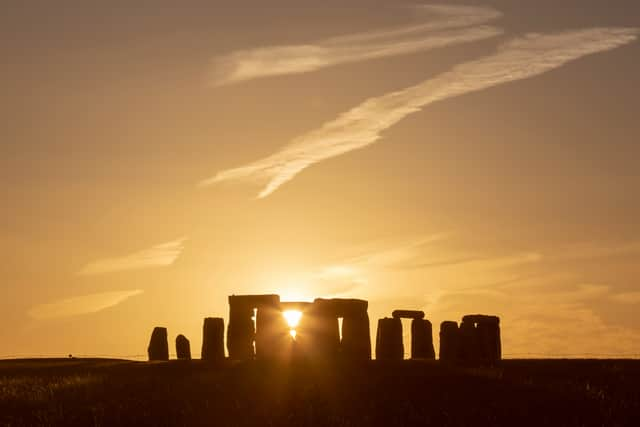Summer solstice 2023: What is it, when it is and how many daylight hours are there?
and live on Freeview channel 276
Summer has officially arrived in the UK, and the summer solstice is here to mark the beginning of the season, as well as the blistering temperatures which continue to soar across the country. This solstice is the first of two that will take place this year.
The summer solstice will mark the longest daylight hours throughout the whole of the yearly calendar for the UK. The amount of daylight hours a place can get will vary from location to location, and depends on how close you are to the North Pole.
Advertisement
Hide AdAdvertisement
Hide AdAreas like Northern Ireland and Scotland will experience longer daylight than the south of England or Channel Islands. The event is celebrated all across the world in many different ways and acknowledged in many different cultures. While we will experience the summer solstice, other parts of the world will celebrate their winter solstice.
So, how many daylight hours will the UK get? Here’s everything you need to know about the summer solstice.
What is the summer solstice?
Summer solstice is known under many other names such as, midsummer, and festival solstice. However, in every instance, it occurs when one of Earth’s poles has its maximum tilt toward the sun.
Summer solstice is the longest day of the year for people living in the Northern Hemisphere of the earth. Contrary to popular belief, summer solstice is a moment rather than the whole day. It takes place at the exact moment the sun reaches its highest point in the sky, which is when the northern hemisphere is tilted most towards the sun.
Advertisement
Hide AdAdvertisement
Hide AdMeanwhile, it is the shortest day of the year for those living in the Southern hemisphere. Summer solstice is also known as the beginning of summer and many people use it as a time to connect with nature and celebrate the summer.
When is the summer solstice?
The summer solstice marks the longest day of the year and falls on Wednesday 21 June at 3:57pm.


Depending on the shift of the calendar, the summer solstice occurs sometime between June 20 and June 22 in the Northern Hemisphere. For the Southern Hemisphere the summer solstice occurs between 20 December and 23 December.
How many daylight hours will there be in the UK?
- London, United Kingdom - sunrise: 04:42am, sunset: 9:19pm
- Birmingham, United Kingdom - sunrise 4:44am, sunset 9:31pm
- Bristol, United Kingdom - sunrise 4:53am, sunset 9:28pm
- Cardiff, United Kingdom - sunrise 4:55am, sunset 9:31pm
- Liverpool, United Kingdom - sunrise 4:43am, sunset 9:41pm
- Newcastle, United Kingdom - sunrise 4:27am, sunset 9:46pm
- Glasgow, Scotland - sunrise: 04:31am, sunset: 10:03pm
- Edinburgh, Scotland - sunrise 4:26am, sunset 10:00pm
- Belfast, United Kingdom - sunrise 4:47am, sunset 10:01pm
How is the Solstice commemorated?
For the majority of people and cultures across the world the celebrations of the summer solstice involve enjoying the sunshine, being out in nature, sumptuous feasts, bonfires, singing and dancing to traditional songs.


Advertisement
Hide AdAdvertisement
Hide AdPeople will travel to various places to see the sunset on the summer solstice late in the evening. Popular spots in the UK to celebrate the summer solstice include Stonehenge, Glastonbury Tor, Ben Nevis, Bryn Celli Ddu, Gwynedd and the Giant’s Ring.
What place will have the most daylight?
The length of the longest day of the year depends on your location and can vary from country to country. Places in the Northern Hemisphere will see the most hours of daylight. Alaska can expect to see up to 19 hours of sunlight.
Countries like Iceland will experience up to 21 hours of sunshine this year, making it the place with the longest day in the world. Countries like Tokyo will enjoy up to 14 hours of daylight.
Places across the UK could see up to 16 hours of daylight. Scotland’s very own Shetland Islands will see the most daylight hours this summer solstice, with a forecast of 19 hours of daylight.
Comment Guidelines
National World encourages reader discussion on our stories. User feedback, insights and back-and-forth exchanges add a rich layer of context to reporting. Please review our Community Guidelines before commenting.
